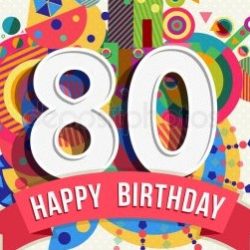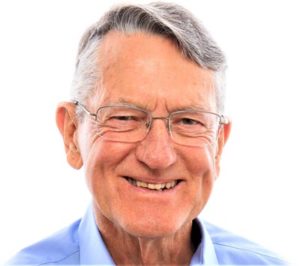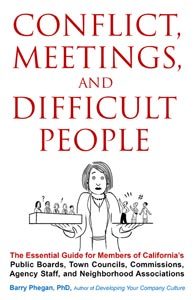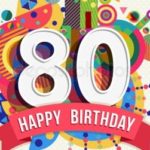 This month I turn 80. Friends ask, “How does it feel?” I reply, “It’s a bit scary, but I’m not sure why.” That got me thinking. At 80 I must be in that “old” group, though I can’t say I feel much different than I did at 79 (or 69). No, I don’t feel old — although I do feel older.
This month I turn 80. Friends ask, “How does it feel?” I reply, “It’s a bit scary, but I’m not sure why.” That got me thinking. At 80 I must be in that “old” group, though I can’t say I feel much different than I did at 79 (or 69). No, I don’t feel old — although I do feel older.
When did I paint my mental portrait of old?
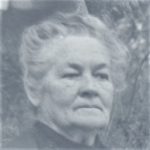 It started in my childhood. I clearly recall my grandmother, who by perhaps scary coincidence, died when she was also 80. As a six-year-old, I remember her unsmiling, wrinkly face, topped by bobby-pinned bright white hair. Terrifyingly serious, seated and judgmental in her puffed-up black crepe widow’s dress, she looked and smelled forbidding.
It started in my childhood. I clearly recall my grandmother, who by perhaps scary coincidence, died when she was also 80. As a six-year-old, I remember her unsmiling, wrinkly face, topped by bobby-pinned bright white hair. Terrifyingly serious, seated and judgmental in her puffed-up black crepe widow’s dress, she looked and smelled forbidding.
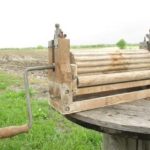 Outside the rear door of her small brick cottage (that our family later lived in) lurked a torture machine. I was stunned to silence that my grandmother kept such a device. Would she give me the treatment during some future visit? Would I survive? Why did she own it?
Outside the rear door of her small brick cottage (that our family later lived in) lurked a torture machine. I was stunned to silence that my grandmother kept such a device. Would she give me the treatment during some future visit? Would I survive? Why did she own it?
Later I was disillusioned and somewhat disappointed, to discover that The Rack was really a vintage corrugated clothes mangle. As one of my few remaining early memories, I can still easily revisit those six-year-old fears — and mysterious excitement. (This photo is not the actual mangle from my childhood.)
All that seems long ago. Now that I’m officially “old”, I strangely have no friends in this “old” category. What happened? My friends are still here!
It’s the “old” category that’s magically vanished — at least for me.
Old was visible when I was young! Now I’m not young, I can’t see it.
How strange is that? I like that I won’t be old — or at least not for a while longer. Maybe I’ll revisit this thought if I make it to the start of my next decade. Will 90 feel like this also? Am I in denial? Maybe, but I’ve always found denial makes my life easier.
My cousin June died recently in Sydney at 96. Whenever I visited my hometown, I treasured our times together. She predictably served petite triangular sandwiches with the crusts cut off, tea with milk and sugar, and cupcakes topped with variously colored icings. Eternally the aspiring actress, gambler, writer, piano player, and grandmother, June never fit my image of old, even though towards the end she could hardly walk, and had a live-in caregiver.
A few years ago, another friend, Elizabeth Pschorr died at 102. When she was 85, she wrote and published an intimate memoir, “A Privileged Marriage”, describing her childhood and survival as a Jew, married to a high-level Nazi, in Germany before and during World War II. Is writing and publishing your first book at 85 what old people do? Like my cousin June, Elizabeth was never old, was always in control, and stayed vibrant to the end.
I confess to feeling a little less vibrant these days. Each morning, when I roll out of bed, I stand and slowly straighten my back until it feels (more or less) how I want. A friend of mine calls these small but accumulating diminishments, “losses”. She confided, “Whenever I have a loss, I try to make up for it. I’ve stopped skiing, but I come to the gym. No more golf, but I walk our dog.”
Making up for our losses?
How far can we each go with “making up”? Or should we? For me, just noticing that I’ve lost something is usually the end of it. I don’t feel the need to make up for it — or attempt to wind back the clock.
I’ve stopped skiing and scuba diving. These were two of my top favorites. I still enjoy hiking, biking, and snorkeling. As my tide ebbs, it reveals other losses, such as stamina and memory. I’m trying to teach my grandson tennis, but after half an hour I’m ready to wrap it up. And, what was it I walked into this room to do — or to get?
Is it my self-indulgent rationalization to claim that my losses are all age-appropriate? Some of my male gym friends describe their workouts as protections against aging, “I’m staying young.”
Well let me be clear, I’m not trying to stay young. I’m happy where I am. Attempts to arrest the clock sound like denial and foolishness. I’m doing what I’ve always done, enjoying using my body as much as I enjoy using my mind. Enjoyment remains my reliable, undiminished constant.
“Is old only visible to the young?”
That’s my question as I approach the end of my life’s path. When I was younger, I thought 80 was old. Now I’m here I don’t feel old. What is your experience? After these reflections on turning 80, I’m truly curious. Is being “old” always around the next bend in your life’s path, so you’ll never arrive? Please let me know how aging is for you.
Thank you for reading along with me.
me, Barry Phegan

